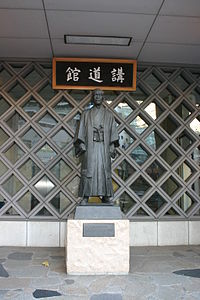Kōdōkan
Kōdōkan (講道館, Kōdōkan?) or Kōdōkan Institute, is the headquarters of the global judo community. It was founded in 1882 by Kanō Jigorō, the creator of judo, and is currently located in an eight-story building in Tokyo, Japan.
The institute's function is to teach classes to those who want to learn and become professional in judo. The study program is authorized as that of a non-regular school according to the Tokyo Metropolitan Government. The course includes the theoretical and practical study of judo, as well as general education topics.
Currently it owns 1,206 tatami mats, grouped into five dojos: main, school, international, women and children; and there are special dojos for retired judokas and for the study of special techniques.
Women's Division
From the beginning Kanō Jigorō taught judo to women from 1893 and in 1926 one of his students, Utako Shimoda, opened a Women's Division with its own separate practice, procedures and ranking system that prohibited women from ascending above 5th dan. Shimoda's goal was to train physical education and judo teachers dedicated to improving public education for boys and girls. Early members of the division include Ayako Akutagawa who rose to 1st dan in 1934, and Noriko Yasuda, among the best teachers in the history of this discipline. Also Keiko Fukuda and Masako Noritomi. Fukuda began judo training in 1935 and was one of 24 women training at the Kodokan. She obtained the first dan in 1939. Almost 5 years after beginning the practice, she began receiving a salary from the Kodokan, where she would become an instructor. Following a campaign denouncing the rule that prohibited women from rising above 5th dan, Fukuda, along with her senpai Masako Noritomi (1913-1982) became the first woman promoted to 6th dan by the Kodokan.
Contenido relacionado
Addendum: Members of the Basketball Hall of Fame
Annex: Rowing at the 1928 Amsterdam Olympics
Annex: Weightlifting at the Atlanta 1996 Olympic Games
